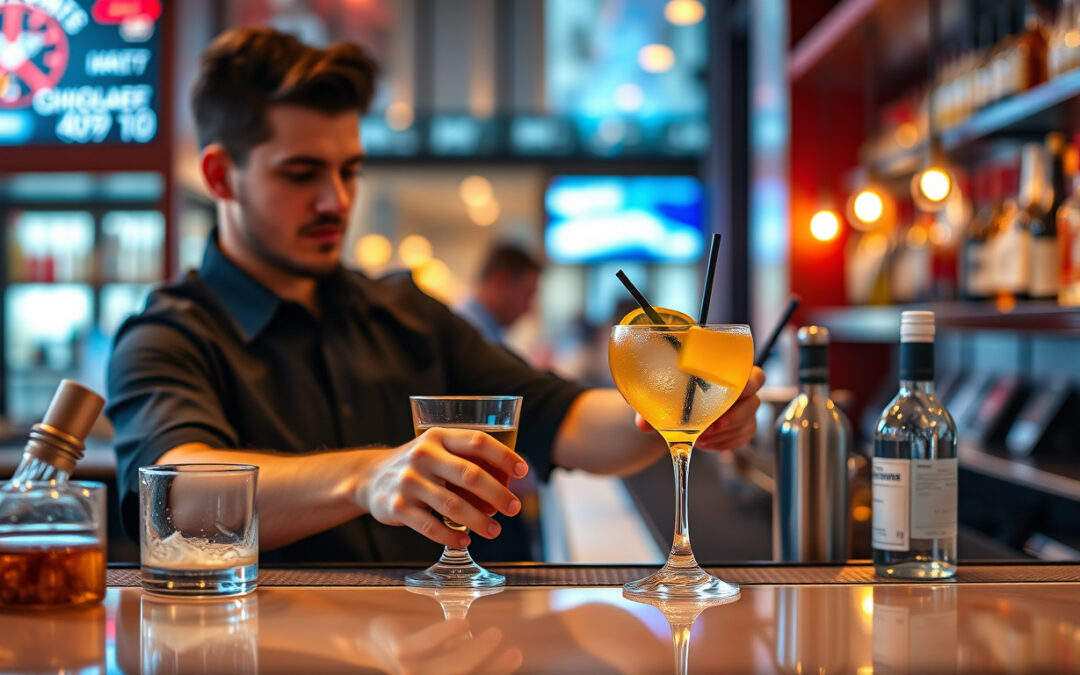When you work in any establishment that serves alcohol, know your alcohol server responsibility. This duty keeps patrons safe and meets legal rules. Serving alcohol means you spot intoxication, stop underage drinking, and handle tough moments. This article gives clear, simple tips so you serve safely, legally, and with professionalism.
What Is Alcohol Server Responsibility?
Alcohol server responsibility means you follow ethical and legal rules. Bartenders, waitstaff, and others serve drinks with care. These rules keep customers safe and help the business avoid fines, license loss, or lawsuits. You learn local laws, spot intoxication, and act quickly to stop harm.
The Importance of Responsible Alcohol Service
Serving alcohol responsibly matters for many reasons:
- Promotes public safety: It lowers accidents and injuries from heavy drinking.
- Prevents underage drinking: It makes sure the law on age is followed.
- Protects businesses: It stops legal problems and keeps a good reputation.
- Supports community well-being: It builds safer social settings.
Key Legal Obligations for Alcohol Servers
Follow these legal steps:
- Check Identification: Look at every customer’s ID to be sure they are of legal age.
- Refuse Service to Intoxicated Patrons: Stop serving someone who shows clear signs of drinking too much.
- Avoid Serving Minors: Do not serve alcohol to anyone under the law’s drinking age.
- Follow Local Alcohol Laws: Know the state and local rules about selling alcohol.
Failing to do these steps can cause serious trouble for both you and the establishment.
Essential Tips for Safe and Legal Alcohol Service
To serve responsibly, use these tips:
1. Always Verify Age with Proper ID
Check each person’s ID. Use driver’s licenses, state IDs, or passports. Train your staff to look close at each document and spot any fake IDs.
2. Monitor Patrons’ Behavior Continuously
Watch closely for signs of intoxication. Look for slurred speech, clumsy moves, or angry words. Early action can stop problems.
3. Use Clear Refusal Techniques for Intoxicated Customers
When you see intoxication, say “no” clearly and politely. For instance, say, “I’m sorry, I cannot serve you more alcohol.” Offer non-alcohol drinks to help ease the moment.
4. Offer Food and Water
Serving food with alcohol slows down its effect. Water keeps everyone hydrated and may lessen overdrinking.
5. Avoid “One More Drink” Mentality
Encourage safe drinking. Do not push extra drinks. This care helps everyone and follows the law.
6. Work as a Team
Talk with coworkers and managers when you see warning signs. A team that works close together brings better safety.
7. Keep Training Up to Date
Join regular training sessions. Updating your knowledge on laws and safe serving skills helps you handle each situation better.
Handling Difficult Situations Responsibly
Sometimes, situations get tough. Here’s how to act:
- Dealing with Intoxicated Patrons: Politely stop serving and ask for help from security or management if needed.
- Handling Underage Drinkers: If you suspect a minor is drinking, refuse service and tell a manager right away.
- Preventing Drunk Driving: Urge patrons to choose taxis, rideshare apps, or a designated driver. Some places even team up with local transport services.
Benefits of Responsible Alcohol Server Practices
Good practices bring many benefits:
- Fewer alcohol-related incidents and injuries.
- Lower legal risks and fewer insurance claims.
- Better customer satisfaction and loyalty.
- An improved reputation in the community.
Alcohol Server Responsibility Checklist
Use this checklist to remember your duties:
- [ ] Verify customer age with a valid ID every time
- [ ] Watch for signs of intoxication during service
- [ ] Refuse service to patrons who are intoxicated or underage
- [ ] Offer food and water to help slow alcohol effects
- [ ] Use clear and respectful words when refusing service
- [ ] Tell coworkers and management about any issues
- [ ] Take part in ongoing alcohol server training
- [ ] Encourage safe ride options for patrons
FAQ: Alcohol Server Responsibility
What is the key responsibility of an alcohol server?
The server must serve alcohol safely. This duty means checking age, stopping service to an intoxicated person, and obeying all laws.

How can servers tell if a customer is intoxicated?
Watch for signs like slurred speech, clumsy moves, angry words, or poor judgment.
Are alcohol servers legally liable for over-serving?
Yes. Many laws hold the server and the establishment responsible if alcohol is given to minors or those who are very intoxicated and harm follows.
Conclusion
Understanding alcohol server responsibility is a must for anyone who serves alcohol. Follow the rules, stay alert, and work as a close team. These simple steps protect your customers and your business. Regular training and attention to safety help build a safe community.
For more training and detailed guidelines on responsible serving, check the National Institute on Alcohol Abuse and Alcoholism (NIAAA). They support safe alcohol policies and education across the nation.
By keeping alcohol server responsibility in mind every day, establishments reduce risks, meet legal rules, and foster a safe and respectful environment.


